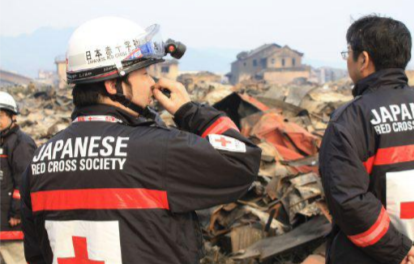
For its part, Japan is made up of islands. Moreover, it boasts one of the world’s strongest economies and among the highest levels of national preparedness for disasters. If any country might be considered ready to respond to a major disaster, it would be Japan. Yet, the 11 March earthquake, and the still-gathering international outpouring of support in its wake, have shown that even this island state cannot expect that it will be alone in the wake of a massive calamity. In other words, when it comes to disaster response, even an island is not really an island.
The 11 March event was reportedly the largest earthquake in Japanese history, leading not only to massive direct damage, but also devastating impacts from an enormous tsunami and a radiological emergency at the Fukushima Daiichi complex. As of the date of this article, over 8,000 were confirmed dead, more than 10,000 more were missing, over 430,000 had been displaced; and while authorities had indicated that widespread radiation poisoning had not yet occurred, fears that it might occur soon remain.
An outpouring of support...
Japan is no stranger to earthquakes and has invested heavily in prevention and preparedness measures, notably strict building codes and retrofitting. Traditionally, however, it has not been eager to seek out or accept international assistance to respond to the effects of disasters. After the Kobe Earthquake in 1995, Japan reportedly turned down 40 of the 60 offers of assistance it received from foreign states. This time, Japanese officials report that they have received formal offers of help from an eye-opening 128 countries and regions and 33 international organizations. Search and rescue teams from as far away as the United States, Turkey, the United Kingdom and South Africa have joined others to help search for persons trapped in buildings. For its part, the Japanese Red Cross has sought only a limited amount of support from the International Red Cross and Red Crescent Movement for its very large-scale response activities, although it is accepting cash donations from both domestic and international sources.
Meanwhile, Japanese authorities have called on international and foreign NGOs to “wait until the situation improves” before considering interventions, because they are still in the “search and rescue phase” of the operation. Nevertheless, a substantial number of foreign NGOs have begun to make assessments and appeals for funds on behalf of affected persons in Japan. This has not gone without some criticism from those who feel that Japan already has enough internal resources. Still, as noted by Michael Kocher of the International Rescue Committee, while “Japan is possibly the most prepared country in the world[,] . . . the scale of this is tremendous and that will sorely test even Japan's capacity."
… and the typical challenges that come with it
Thus, a familiar set of issues is starting to arise in the rather unfamiliar setting of a rich developed country. Stories are already starting to surface alleging bureaucratic blockages to incoming assistance (like this one about representatives of a British NGO who were reportedly refused permission to access the disaster area because of the failure of their embassy to issue a letter of support, and this one about quarantine delays in the entry of the rescue dogs of a Swiss search and rescue team). Likewise, we are starting to hear about eyebrow-raising efforts (like this one, exclusively dedicated to encouraging the large-scale importation of socks, described as “something that deliver[s] meaning past the need of the moment, something more special than what people get from emergency teams and government supplies”).
There will doubtless be many lessons from Japan’s experience of the current disaster. One of the first, though, must be that more governments should be thinking in advance about how they would manage outside assistance in the event of a massive disaster, to ensure that the necessary aid is provided quickly and that unnecessary aid does not obstruct and distract from relief and recovery efforts.